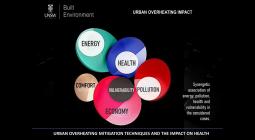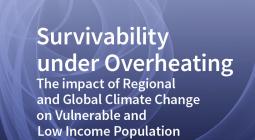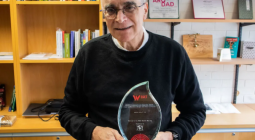Recent Progress on Mitigation Technologies
High Performance Architecture (HPA) Research Cluster Webinar Series 2022
Date and time:
Location: Online event
About this event
Regional climate change in cities is the most documented phenomenon of climate change. Higher urban temperatures are documented experimentally for more than 450 major cities in the world. Numerous investigations demonstrate that the mean magnitude of the temperature increase may exceed 4-6 C, while at the peak it may exceed 10 C. The serious increase of the frequency and the strength of heatwaves creates strong synergies between the global and regional climate change and intensifies the magnitude of the overheating.
Urban overheating causes a serious impact both on the energy demand and generation sectors. It increases the cooling energy consumption of buildings, rises the peak electricity demand, and obliges utilities to build additional power plants. It affects seriously health issues and in particular heat related mortality and morbidity, impacts the concentration of pollutants and damages the urban environmental quality, and finally deteriorates the levels of local vulnerability and thermal comfort.
To counterbalance the problem of urban overheating, numerous heat mitigation systems and technologies are proposed, and implemented in more than 250 large scale urban projects. Mitigation policies and technologies aim to strength the cooling potential of heat sinks and weaken the intensity of the heat sources. Among the developed mitigation technologies, the use of advanced materials like the recently developed photonic components and the reflective, cool materials, the implementation of additional greenery in buildings and open spaces, the use of passive evaporative systems involving additional irrigation of urban zones and finally the dissipation of the excess heat into the ground seems to provide the higher mitigation potential.
This talk reviews and reports the recent progress and knowledge on the specific impact of current and projected urban overheating on energy, peak electricity demand, air quality, mortality and morbidity and urban vulnerability. In parallel, it discusses new findings related to the characteristics and the magnitude of urban overheating, .and reports and analyses the recent knowledge on the synergies between urban heat islands and heat waves. Finally, it presents the recent developments in the field of mitigation and adaptation technologies for buildings and cities and provides inside information on the current and future potential.
Mattheos Santamouris is a Scientia, Distinguished, Professor of High Performance Architecture at UNSW, and a past Professor at the University of Athens, Greece. Mat is also a visiting Professor of the Cyprus Institute, Metropolitan University London, Tokyo Polytechnic University, Bolzano University, Brunnel University, Seoul University National University of Singapore, and UITM Univ Malaysia. Mat is a past president of the National Center of Renewable and Energy Savings of Greece. He is also the editor in chief of the Energy and Buildings Journal; the past editor in chief of the Advances Building Energy Research; an associate editor of the Solar Energy Journal; and a member of the editorial board of 14 journals. Mat is also the editor of a series of books on Buildings, published by Earthscan Science Publishers, the editor and author of 20 international books published by Elsevier, Earthscan, Springer, etc., and the author of 390 scientific articles published in journals. Mat has reviewed a wide range of research projects in 29 countries including USA, UK, France, Germany, Canada, Sweden, etc. He was ranked as the world’s top cited research in the field of Building and Construction by the Stanford University ranking system between 2019-2021. Mat was also a Highly Cited Researcher in the Clarivate ranking for 4 continuous years and ranked as the 538th researcher in the world in all scientific disciplines by Stanford University in 2021 from over 200,000 influential researchers.
For more information please contact hpa@unsw.edu.au




